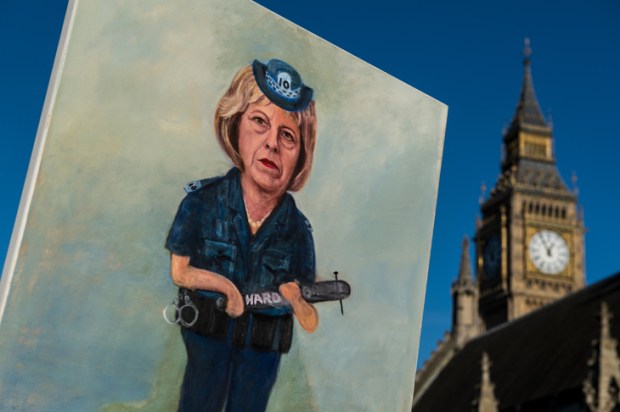John Bercow could go down as a great reforming Speaker of the House of Commons. It’s thanks to him, in large part, that the Commons chamber once again seems like the cockpit of the nation. But he now risks becoming the second successive Speaker to be ousted from his job. Even his friends admit that his inability to conceal his dislike for David Cameron and various Tory backbenchers has put his position in jeopardy.
Bercow is a contrast to his predecessor Michael Martin. He is razor sharp and confident in his own judgment. No one doubts his intellectual ability. But Bercow has a large number of detractors. He’s gone from being on the hard right of the Tory party to a darling of the Labour benches — and he has picked up many enemies on the way. But the trouble with Bercow is not so much his politics as his personality. He doesn’t suffer fools gladly and treats a lot of Tory MPs as if they were fools.
Nevertheless, Bercow has helped Parliament rediscover its purpose. As Speaker, he consistently calls the amendments which best test the government’s position. This approach, the Bercow doctrine, has made it far easier for Parliament to challenge the executive. Second, by granting so many urgent questions, he has ensured that ministers who have something to announce — or account for — come to the Commons to do so. They know that the choice they face is between making a statement or Bercow granting the opposition an urgent question and them being summoned to the chamber to answer it. Given that situation, most ministers choose to make a statement. Finally, he has upped the tempo of debate. By moving through the order paper at a pace, he has made it impossible for ministers to kill time by boring on in reply. He also uses the discretion of the chair to ensure that a line of questioning can be followed through.
It is inevitable that a set of changes which strengthen Parliament against the executive should lead to grumbling from ministers and whips. But what is endangering Bercow is the widespread sense that he lets his personal animus interfere with his judgment; that he is not even-handed. As one of his allies admits, ‘what undermines John is his temper’.
Bercow’s chairing of the last few sessions of Prime Minister’s Questions has drawn particular criticism. The Speaker’s attitude to heckling has seemed to be determined by which set of benches it is coming from. He has even moved on to commenting on the substance of Cameron’s answers. One minister complains that Bercow has gone from an irritant to a problem. He describes Bercow’s behaviour as ‘malevolent and destructive’.
That might sound rather hyperbolic. But Bercow is being exceedingly curt with people. It is not just ministers who are feeling the rough side of his tongue. One of the few Tories who backed him for Speaker says that his increasingly aggressive put-downs of backbenchers have begun to alienate colleagues. An MP with an extremely good grasp of the state of parliamentary opinion tells me, ‘Until a few weeks ago, I would have said John was in no danger. But he’s reaching a tipping point.’
The danger for Bercow is not a co-ordinated attempt to unseat him — his opponents do not have the numbers for that — but him losing authority in the Chamber. That would be the beginning of the end for him.
A case in point came at last week’s Prime Minister’s Questions. Cameron, spying Bercow poised to intervene on him, declared, ‘I am keen to answer the question, and it is a very direct answer,’ and simply carried on. It is easy to imagine how this could have led to a more direct confrontation between the two men. Indeed, Bercow’s anti-Cameron slant in his chairing of PMQs in recent weeks has led to a situation where the Tory whips would not be doing their jobs if they were not trying to undermine him.
The scorn from the chair is also contributing to an unpleasant atmosphere in the Commons. One long-serving MP observes that there is now a more personal edge to proceedings in the chamber than at any time in the past two decades.
Part of the problem is that Bercow is an accidental reformer. He has come upon this parliamentary reform agenda as a result of his position rather than ideological conviction. Indeed, in some regards, he has not sufficiently defended the rights of Parliament. For example, he should have fought significantly to increase the amount of money going to support the investigative work of select committees. Those who do believe in strengthening Parliament against the executive are increasingly concerned that Bercow’s antics are giving their cause a bad name. If he carries on like this, there’s a real danger that his whole reform agenda could be seen as nothing more than a way to make life difficult for Cameron and co.
Another part of the problem is that Bercow is not temperamentally suited to the role. As one long-time colleague puts it, ‘He’s not a natural Speaker. He loves speaking.’ Bercow ends up making himself the story more than the Speaker should.
The situation is not irreparable. If he cut out the jibes from the chair and concentrated on being studiously impartial, the anger towards him would abate. His opponents know that they don’t have the numbers to remove him in a direct contest and so things would return relatively quickly to the status-quo ante. But if he carries on like this, he is heading for a full-blown confrontation which could — and probably would — end disastrously for him. The Speaker has to have authority in the chamber. Once he’s lost it, his support will drain away.
The removal of a second successive Speaker would also be a disaster for the House of Commons. The Speaker should be above the hurly-burly of politics. He should call for order, rather than being brought to book.
If two Speakers were to be deposed by the House in succession, it would reduce the authority of the chair. As one senior parliamentarian argues, ‘To bump off two Speakers in a row would set a dangerous precedent. It would begin the politicisation of the role.’ For the good of Parliament as well as his own legacy, Bercow needs to rein himself in.
Got something to add? Join the discussion and comment below.
Get 10 issues for just $10
Subscribe to The Spectator Australia today for the next 10 magazine issues, plus full online access, for just $10.
You might disagree with half of it, but you’ll enjoy reading all of it. Try your first month for free, then just $2 a week for the remainder of your first year.















Comments
Don't miss out
Join the conversation with other Spectator Australia readers. Subscribe to leave a comment.
SUBSCRIBEAlready a subscriber? Log in